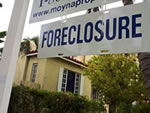Foreclosures
Foreclosure News Items
But where will they live? In their cars?
by Broderick Perkins
(4/6/2012) Erate Exclusive - If you think it's unusual for homeowners to pay their car notes and credit card bills at the expense of losing their homes, don't. It isn't.

Lasting fallout from the Great Recession has reordered what makes sense to a financially struggling household.
Homeowners who make car payments and credit card payments, at the expense of risking their mortgage, figure they can't drive a home to work or use their house to look for another job.
While home equity is stuck on empty, that four wheeler's tank could be full of the stuff. Toss in a sizable credit limit on an paid-up-to-date credit card and a given household just might have enough credit to make it until better days are here again.
To many households, owning a home these days is like driving a wreck. It ought to be in the junkyard.
Not warranting the head-scratching fuss the report has commanded, "TransUnion's Payment Hierarchy Study" recently found that consumers increasingly pay car loans and credit cards before paying the bill for their home loan and are more likely to default on the latter.
And if they had to choose just one to pay first? Well let's just say homeowners aren't so pedestrian about walking away from their homes. More of them are driving away. The auto loan gets the checkered flag.
Burning rubber in the driveway
"The reversal in payment patterns between credit cards and mortgages has been well documented, but our findings were illuminating because it had not been previously clear that auto loans were considered a higher priority by consumers than both credit cards and mortgages," said Ezra Becker, vice president of research and consulting in TransUnion's financial services business unit.
"With unemployment remaining high and real estate values remaining stagnant or further depreciating, consumers continued to pay their credit cards ahead of their mortgages. However, the importance of their auto loans appears to have trumped even the value they place on their credit cards," Becker added.
TransUnion examined a sample of some 4 million consumers in each quarter of 2011. Those consumers had at least one open auto loan and one open bankcard and one open mortgage. Each quarter there was a clear preference for remaining current on auto loans, ahead of credit cards and mortgages.
• Nearly 40 percent were delinquent on a mortgage while current on their auto loans and credit cards.
• More than 17 percent were delinquent on a credit card while current on their auto loans and mortgages.
• Only 9.5 percent were delinquent on an auto loan while current on their credit cards and mortgages.
Becker said a ride to work and a way to get to job offers were key reasons consumers kept a tight grip on the steering while driving away from the mortgage.
"The impact of repossession is greater than the loss of a credit card. In addition, consumers may have equity in their autos after several years of payments that they are looking to preserve -- which is no longer the case for most homes," Becker said.
Strategic defaulters drive their own hard bargain
Giving preference to the car note is the same kind of behavior FICO uncovered a year ago when some strategic defaulters were really being strategic about their finances. Strategic defaulters typically can afford their mortgage payment but choose not to for a variety of reasons. A primary reason is they are underwater - the home is worth less than the mortgage - and they likely won't recover sufficient equity to make up the difference for years, a decade or longer, if ever.
FICO's findings on strategic default behavior revealed"
• Compared to other defaulters, strategic defaulters have not been in their homes very long. To short-timers, a strategic default is a no-brainer.
If you purchased your home at the height of the boom and suffered a big value hit, you may not recover to the full purchase price of hour home for years, if ever. Since you've paid into your investment for only a few years, you have less to lose than long-timers.
Without the burden of mortgage payments you'll have time to stash away perhaps tens of thousands of dollars before the lender finally forecloses. Later, a cheaper rental will cut your housing costs and build in more savings.
• Strategic defaulters use credit wisely. Fewer than 10 percent of strategic defaulters maxed out their credit cards. More than 35 percent of non-strategic defaulters did likewise.
If you manage to keep existing credit accounts, you'll have unused credit to fall back on.
• Strategic defaulters shop for new credit card lines before they stop paying their mortgage. In the days of waning equity and fears of job loss, some homeowners used the same strategy to tap home equity before it disappeared or they were out of work.
Stocking up on new credit before defaulting acknowledges credit will be tough to come by after default.
• Those who walk away from their homes and into foreclosure are able to make calculated credit moves because they have higher credit scores. The higher the credit score the more likely the default was strategic. Most strategic defaulters have credit scores above 620. Defaulters with a credit score of 700 or more are more than twice as likely to be strategic.
Risks of putting the brakes on the mortgage payment
The higher the credit score before default, the higher the score will be after a potential 150-plus possible negative credit score hit that comes with foreclosure. For some, that could put access to credit within reach, if only after a few years.
The FICO report was not designed to serve as a blueprint for those considering walking or driving away from their mortgage, but it did provide a great deal of insight on strategic defaulters' behavior.
While you may be able to cushion the financial blow with careful planning and a professional or two holding your hand during the ordeal, any default is risky business you'll live with for some years to come.
More Related Articles:
Homeless Vets Get a New "Lease" on Life: HUD Provides Funding for Housing
Pilot "Mortgage to Lease" Program offers New Option to Foreclosure
Healthy mortgages far outweigh distressed home loans
More homeowners consider strategic defaults, perhaps to their detriment
Resolve to balance credit card use with reduced debt and more savings
Paying credit cards on time, letting the mortgage go, common among struggling households

